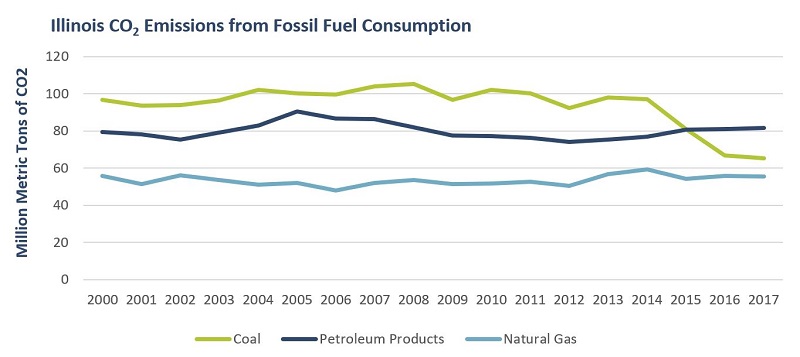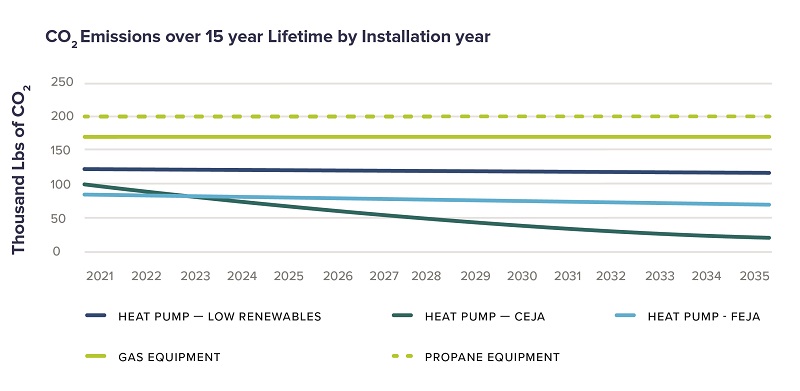Illinois Building Electrification: Heat Pumps Can Support Illinois Climate Goals
The electrification of space and water heating is a key component of reducing greenhouse gas emissions from the building sector in Illinois. A new analysis from Elevate Energy and Rocky Mountain Institute (RMI) shows that improvements in electric heat pump technology and progress in decarbonizing the electricity grid provide an effective pathway to meeting Illinois climate goals.
Illinois is poised to be a national climate leader. Last summer, Illinois Governor Pritzker signed an executive order committing to cut carbon emissions in line with the Paris Climate Agreement and joined 24 other U.S. governors in the U.S. Climate Alliance. Additionally, a coalition of advocates is organizing around proposed legislation called the Clean Energy Jobs Act (CEJA), which requires 100% renewable electricity in Illinois by 2050.
These efforts to clean up the grid are vital, but alone they are not enough for Illinois to meet its climate commitment. The use of fossil fuels in buildings accounts for 18% of Illinois’ energy-related emissions, and this percentage will rise if action is not taken. Additional strategies are needed to draw down buildings-sector emissions.
In addition to reducing carbon emissions, electrification provides benefits to underserved communities such as improved indoor air quality, reduced utility burden, living-wage jobs, and improved comfort at home.

Heat Pumps: A Key Electrification Pathway
A heat pump is an energy-efficient heating and cooling system for a home. Electric heat pumps use a small amount of electricity to move heat, rather than generating heat by burning fossil fuels as a conventional furnace does.
New analysis from Elevate and RMI examines the lifetime emissions impacts of using heat pumps for space and water heating in Illinois.
Findings show that:
- Heat pumps reduce emissions: Across a variety of grid decarbonization scenarios (ranging from CEJA-level ambitions to pessimistic levels of renewable energy growth) installing a heat pump instead of natural gas or propane systems saves emissions over its lifetime. This is because heat pumps use less energy to heat the same space, and as the grid gets cleaner the electricity used is increasingly from emissions-free sources like the sun and wind.
- Illinois should start incentivizing heat pumps today: Even with the current grid mix, installing a heat pump today will save emissions over the lifetime of the equipment. This is true not only in Illinois but also for 99% of the US population. HVAC equipment has a long life and the timeline for cleaning up the grid is short, making this an investment worth making today.
- The more renewables the better: Building decarbonization initiatives centered around the deployment of heat pumps will be improved with more renewables on the grid. Moving to heat pumps extends the impact of this cleaner grid.
Where Do We Start Implementing Change?
State leadership will be key in the national movement to decarbonize buildings. Bold policies like Illinois’ proposed CEJA legislation will create opportunities for the deep decarbonization of other sectors.
To maximize a transition to renewable electricity and decarbonize the building sector, states like Illinois should:
- Lead with equity. Electrification of buildings should reach the most vulnerable households first, including communities most harmed by the extraction and burning of fossil fuels. Anticipated impacts like improved comfort and indoor air quality should be properly understood and valued. Policies and programs should ensure that electrification does not increase utility costs for renters or low-income households.
- Leverage supporting policies: Pair renewable energy policies with energy efficiency and building electrification initiatives.
- Set heat pump targets: Set heat pump installation targets and incentives to provide market signals and support grid planning for added electrification.
- Stop investing in fossil fuel infrastructure: Further investment in fossil fuel infrastructure is incompatible with meeting climate goals and should be strongly scrutinized. The failure to do so may lead to billions in stranded assets that can be instead deployed to incentivize alternatives like efficient electric heat pumps.
It is important that states like Illinois do not delay actions that promote efficient heat pumps. The transition away from fossil fuel combustion in buildings has immediate climate and health implications that will take time to deploy equitably. A building decarbonization pathway should move at the speed of inclusion – ensuring that historically vulnerable populations are centered in this movement and experience the economic and health benefits related to energy savings, workforce development, and improved air quality. This work will be critical to ensuring climate action proceeds in tandem with racial and economic justice.
Read the full analysis and learn more about our research on our publications page.





